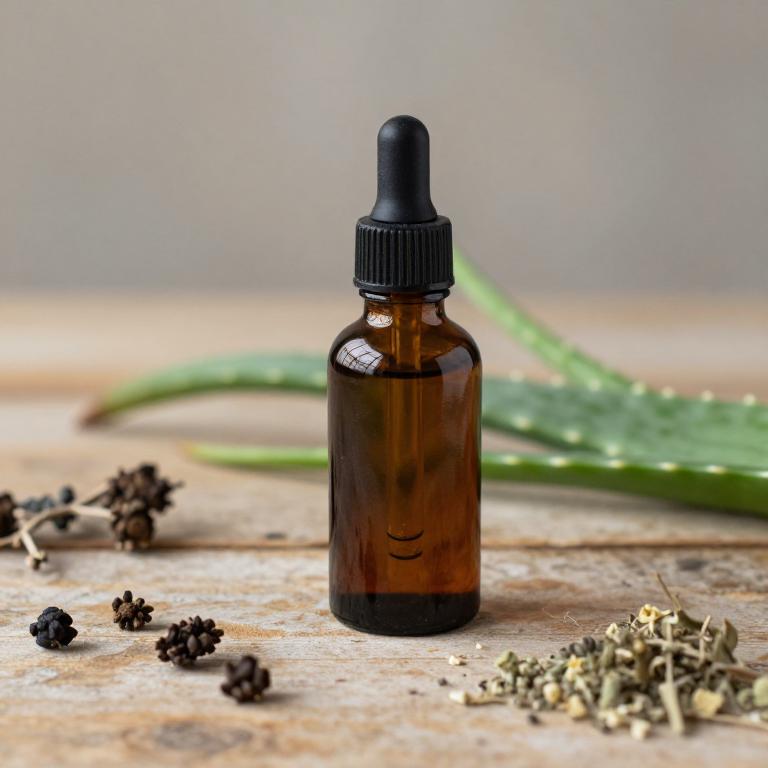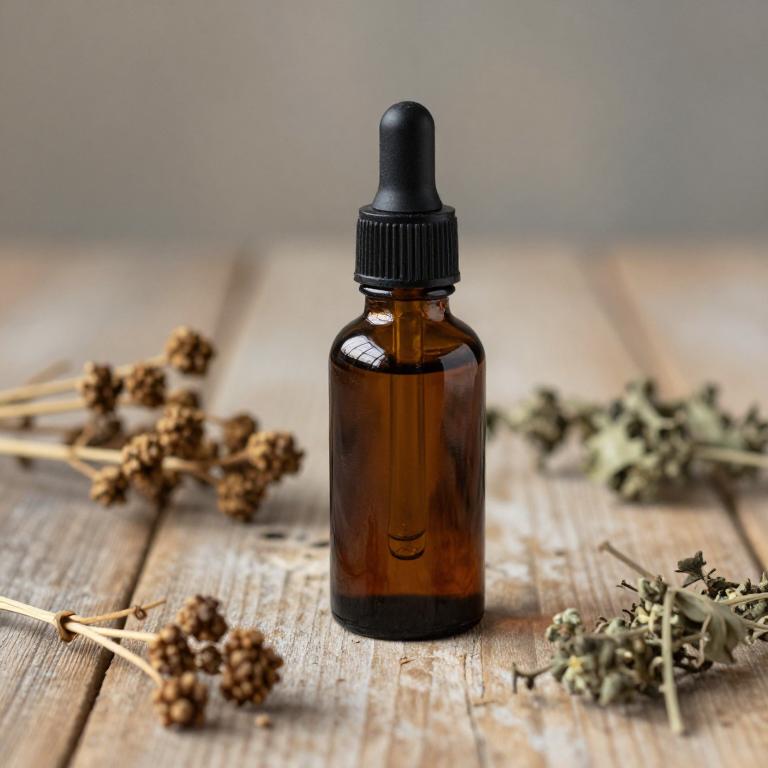10 Best Herbal Tinctures For Psoriasis

Herbal tinctures have gained popularity as a complementary therapy for managing psoriasis symptoms, offering a natural alternative to conventional treatments.
These tinctures are typically made by soaking herbs in alcohol or vinegar to extract their active compounds, which may have anti-inflammatory and immunomodulatory properties. Commonly used herbs include turmeric, echinacea, and licorice root, each believed to support skin health and reduce redness and scaling. While some individuals report relief from using these tinctures, their effectiveness can vary, and they should not replace prescribed medical treatments without consulting a healthcare professional.
It is important to ensure the quality and purity of herbal products, as they are not always regulated in the same way as pharmaceuticals.
Table of Contents
- 1. St. john's wort (Hypericum perforatum)
- 2. Aloe vera (Aloe barbadensis)
- 3. Stinging nettle (Urtica dioica)
- 4. Salvia (Salvia officinalis)
- 5. Echinacea (Echinacea purpurea)
- 6. Turmeric (Curcuma longa)
- 7. Blessed thistle (Cnicus benedictus)
- 8. Dandelion (Taraxacum officinale)
- 9. Thistle (Silybum marianum)
- 10. Chaste tree (Vitex agnus-castus)
1. St. john's wort (Hypericum perforatum)

Hypericum perforatum, commonly known as St. John's Wort, is a herbal remedy that has been traditionally used for its potential anti-inflammatory and immunomodulatory properties.
While it is well-known for its use in treating mild to moderate depression, recent research suggests it may also offer benefits for individuals with psoriasis due to its ability to reduce skin inflammation and inhibit the proliferation of keratinocytes. When used as a tincture, Hypericum perforatum can be applied topically to affected skin areas, potentially alleviating symptoms such as redness, scaling, and itching. However, it is important to consult with a healthcare provider before using this herb, as it may interact with certain medications and has potential side effects.
Despite its promising properties, more clinical studies are needed to fully establish its efficacy and safety for psoriasis treatment.
2. Aloe vera (Aloe barbadensis)

Aloe barbadensis, commonly known as aloe vera, has been traditionally used for its soothing and healing properties, and its herbal tinctures are increasingly being explored for their potential benefits in managing psoriasis.
These tinctures are typically made by extracting the active compounds from the aloe leaf, which include polysaccharides, enzymes, and antioxidants that may help reduce inflammation and promote skin regeneration. Some studies suggest that aloe vera may help alleviate symptoms such as redness, scaling, and itching associated with psoriasis by modulating the immune response and enhancing skin barrier function. However, while anecdotal evidence and preliminary research show promise, more clinical trials are needed to fully establish its efficacy and safety for psoriasis treatment.
As a complementary therapy, aloe barbadensis tinctures may offer a natural alternative or adjunct to conventional treatments, but they should be used under the guidance of a healthcare professional.
3. Stinging nettle (Urtica dioica)

Urtica dioica, commonly known as stinging nettle, has been traditionally used in herbal medicine for its anti-inflammatory and detoxifying properties.
When prepared as a tincture, Urtica dioica may help alleviate symptoms of psoriasis by reducing skin inflammation and supporting the body’s natural detoxification processes. The tincture is typically made by soaking fresh or dried nettle leaves in alcohol, allowing the active compounds to be extracted over time. Some studies suggest that compounds in nettle, such as histamine and flavonoids, may have a positive impact on skin health and immune function.
However, it is important to consult with a healthcare professional before using nettle tinctures, as they may interact with certain medications or have side effects in some individuals.
4. Salvia (Salvia officinalis)

Salvia officinalis, commonly known as sage, has been traditionally used for its anti-inflammatory and antimicrobial properties, making it a potential candidate for herbal tinctures in the management of psoriasis.
These tinctures are typically prepared by steeping the dried leaves of the plant in alcohol, allowing the active compounds such as rosmarinic acid and flavonoids to be extracted. Some studies suggest that sage may help reduce skin inflammation and slow the rapid growth of skin cells associated with psoriasis. However, it is important to note that while sage tinctures may offer supportive benefits, they should not replace conventional medical treatments.
Always consult with a healthcare provider before incorporating any herbal remedy into a psoriasis treatment plan.
5. Echinacea (Echinacea purpurea)

Echinacea purpurea, commonly known as purple coneflower, is a popular herbal remedy that has been traditionally used to support immune function and reduce inflammation.
While it is not a cure for psoriasis, some studies suggest that its anti-inflammatory and immunomodulatory properties may help alleviate symptoms in certain individuals. Echinacea tinctures are typically made by soaking the dried plant material in alcohol, which extracts the active compounds such as alkamides, caffeic acid derivatives, and polysaccharides. When used as a complementary therapy, echinacea tinctures may help reduce the frequency and severity of psoriasis flare-ups, though they should not replace conventional treatments.
It is important to consult with a healthcare provider before using echinacea, as it may interact with certain medications or exacerbate autoimmune conditions.
6. Turmeric (Curcuma longa)

Curcuma longa, commonly known as turmeric, has been traditionally used for its anti-inflammatory and antioxidant properties, making it a popular herbal remedy for psoriasis.
Curcuma longa herbal tinctures are concentrated extracts of the rhizome, typically prepared using alcohol to preserve the active compounds, such as curcumin. These tinctures may help reduce inflammation, redness, and scaling associated with psoriasis by modulating inflammatory pathways in the body. While some studies suggest potential benefits, more clinical research is needed to confirm their efficacy and optimal dosing for psoriasis treatment.
As with any herbal supplement, it is important to consult a healthcare provider before use, especially if taking other medications or undergoing treatment for psoriasis.
7. Blessed thistle (Cnicus benedictus)

Cnicus benedictus, also known as blessed thistle, is a herbal tincture that has been traditionally used for its potential anti-inflammatory and detoxifying properties.
While it is not a primary treatment for psoriasis, some alternative medicine practitioners suggest it may support liver function and reduce systemic inflammation, which could indirectly benefit psoriasis symptoms. The tincture is typically prepared by soaking the dried herb in alcohol for several weeks, allowing the active compounds to be extracted. However, it is important to consult with a healthcare professional before using Cnicus benedictus as a supplement, as it may interact with certain medications or have side effects in some individuals.
Overall, while it may be considered as a complementary therapy, it should not replace conventional psoriasis treatments prescribed by a dermatologist.
8. Dandelion (Taraxacum officinale)

Taraxacum officinale, commonly known as dandelion, has been traditionally used in herbal medicine for its potential anti-inflammatory and detoxifying properties.
Tinctures made from the leaves and roots of this plant are often used to support liver function and reduce systemic inflammation, which may benefit individuals with psoriasis. Studies suggest that dandelion may help regulate skin cell turnover and reduce the buildup of toxins that contribute to psoriasis flare-ups. While more research is needed, some users report improvements in skin clarity and reduced redness when using dandelion tinctures as part of a holistic treatment plan.
As with any herbal remedy, it is advisable to consult a healthcare professional before incorporating dandelion tinctures into a psoriasis management regimen.
9. Thistle (Silybum marianum)

Silybum marianum, also known as milk thistle, is a herbal remedy that has gained attention for its potential benefits in managing psoriasis.
The active compound, silymarin, is believed to possess anti-inflammatory and antioxidant properties that may help reduce skin inflammation and oxidative stress associated with psoriasis. Herbal tinctures derived from Silybum marianum are often used as a complementary therapy alongside conventional treatments to support skin health. However, it is important to consult with a healthcare professional before using these tinctures, as they may interact with other medications or have side effects.
While some studies suggest promising results, more research is needed to fully understand their efficacy and safety in treating psoriasis.
10. Chaste tree (Vitex agnus-castus)

Vitex agnus-castus, commonly known as chaste tree, has been traditionally used in herbal medicine for its potential anti-inflammatory and hormonal balancing properties.
Herbal tinctures made from Vitex agnus-castus are often used to support skin health and may help alleviate symptoms of psoriasis by reducing inflammation and modulating immune responses. While scientific research on its effectiveness for psoriasis is limited, some studies suggest that its compounds may influence hormonal pathways that contribute to skin conditions. As a complementary therapy, Vitex agnus-castus tinctures are typically taken in low doses and should be used under the guidance of a healthcare professional.
It is important to note that herbal treatments should not replace conventional medical care for psoriasis, but may be considered as part of an integrative approach.